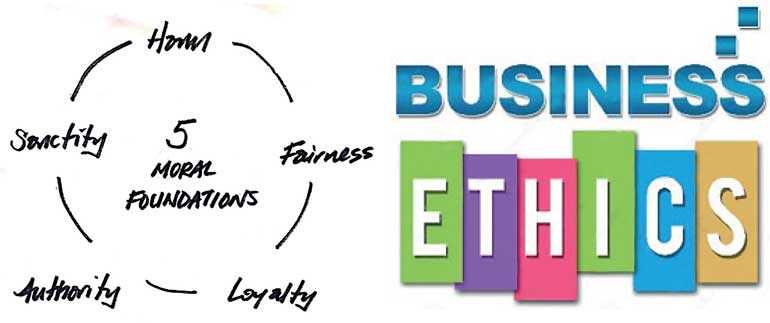Monday Feb 16, 2026
Monday Feb 16, 2026
Friday, 8 January 2021 00:00 - - {{hitsCtrl.values.hits}}

According to Hope Wilson, “Business success is running a profitable firm that conducts business with honesty and integrity, makes meaningful contributions to the communities, which serves and nurtures  high-quality, balanced lives for its employees.”
high-quality, balanced lives for its employees.”
A common view of a business firm embraces that employees, customers, shareholders, and suppliers are key organisational stakeholders. While obligations to these stakeholders are sometimes considered to be motivated by organisational self-interest, the ethical perspective asserts the rightness or wrongness of specific firm actions independently of any social or stakeholder obligations. While practicing good business ethics, it helps to reduce unnecessary cost and achieve many more sustainable goals. Decently-run businesses are possible to increase their productivity because employees will take pride in their work. Business ethics deal with the innovation and creativity practices of moral standards in the business environment. Morals are judgments, standards and rules of good conduct in the society.
When running a business, right and wrong things depend with violence or cheating. Hence, human beings used to determine what is morally right and wrong. Upsetting or offensive behaviours in the workplace, such as aggression, unfairness, impoliteness, and bullying can lead to a number of problems.
There are different theories which help for business success through ethical practices. Moral foundation theory is another unique theory which can be practiced for cultivating ethics as it leads to run the business by ethics to achieve business goals. Moral foundations theory is a social psychological theory which was introduced to explain variation in human moral reasoning. It was first proposed by the psychologists Jonathan Haidt and Jesse Graham. Moral foundation theory argues that there are five basic moral foundations:
Care: Cherishing and protecting others; opposite of harm
Fairness: Rendering justice according to shared rules; opposite of cheating
Loyalty: Standing with your group, family, nation; opposite of betrayal
Authority: Submitting to tradition and legitimate authority; opposite of subversion
Sanctity: Abhorrence for disgusting things, foods, actions; opposite of degradation
Care
When establishing a system as easy and automatic to connect the perceptions of suffering with motivations to care, nurture, and protect are what it is recognised as the care/harm foundation. Ethics of kindness, gentleness, and nurturance interprets the care foundation. Companies should have an ability to care for and be connected with staff and others. It will help to identify the feel or dislike the pain of others. If an organisation does not care their stakeholders including staff, it will be harmful to the organisation in different ways.
Fairness
This is related to the evolutionary process of reciprocal altruism. It generates ideas of justice, rights, and autonomy. Most of people help and kind to others. If someone help or kind to someone by partially, it feels unfair or cheating. When introducing a system or a practice, it should be fair to everyone. People are very emotional about fairness, trust and trustworthiness. Hence, the practices and decisions would be justified to anyone. There is a connection between fairness and justice. The fair practices will be supportive for business results as staff’s morale is getting boosted through this concept.
Loyalty
Individuals have a capability to form shifting associations, and value those who are loyal to those coalitions. Those who have the quality of loyalty, they stand with the team or organisation, family and nation. When dealing with the people, they are ready for patriotism and self-sacrifice for the group. Therefore, when running a business, it is essential to identify a team with loyalty.
Authority
This concept was moulded by long history of hierarchical social interactions. When people interact with the society, it was controlled by their leadership and followership while respecting for traditions and authority. The society enforced social orders and the obligations of hierarchical relationships, such as obedience, respect, and the fulfilment of role-based duties. In a company, the management team has to ensure that necessary authority has been granted to fulfil duties with respect to each staff member.
Sanctity
This foundation was shaped by the psychology of disgust and contamination. It underlies religious notions of striving to live in an elevated, less carnal and more noble way. Individuals whose minds were structured in advance of experience to develop a more effective ‘behavioural immune system’ (Schaller & Park, 2011). Hence, when operating a business firm, it is better to understand each staff member’s behaviour and their expectations. Also, some of them may be very stressful. Therefore, making a work environment with sanctity is very important to control individuals’ emotions and get connected with them.
Care, Fairness, Loyalty, Authority and Sanctity are helpful to ensure business performance, and connect with the business world while motivating staff. When following the Moral foundation by an organisation, it provides the foundation for trust, collaboration, and commitment to action. Hence, while enhancing the ethical practices in an organisation, the business ethics help to retain top talent, minimise the risk, enhance reputation and ensure the achievement of business goals.
The New Year 2021 is a more challengeable year for the business world. It is necessary extra inputs to maintain the profit, reduce the cost and sustain the business. Converting the business into ethical business, converting workplace practices into workplace ethical practices, and promoting ethics among staff members are better ways to normalise the business results while facing challenges.
(The writer holds a PhD (Reading), MLHRM, PgD. in HRM, BSc (Business Mgt.) Special, and is a Chartered Member of CIPM, Professional Member of Association of HR Professionals and HRM Consultant. He can be contacted via: [email protected].)